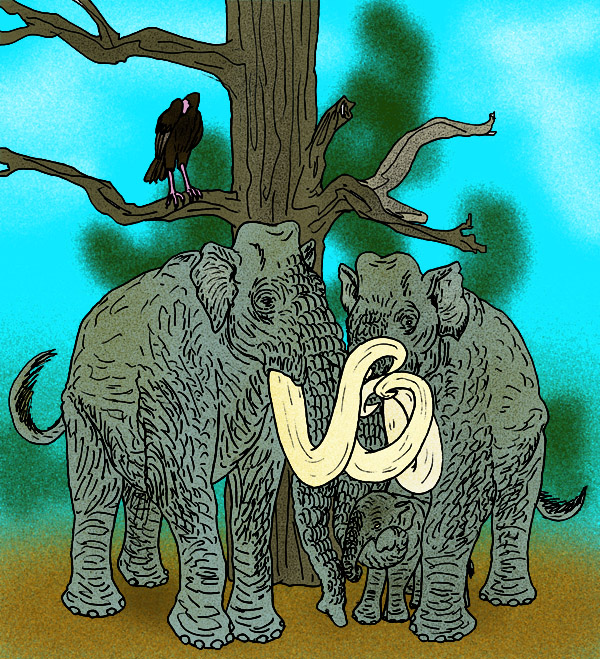|
| Query: Imperial mammoth | Result: 1st of 6 | |
Imperial Mammoth (Mammuthus imperator) - Wiki
| Subject: | Imperial Mammoth (Mammuthus imperator) - Wiki
| |

| Resolution: 600x659
File Size: 277703 Bytes
Date: 2007:06:06 08:34:07
Upload Date: 2008:01:14 12:50:35
|
Mammuthus imperator
From Wikipedia, the free encyclopedia
Order: Proboscidea
Family: Elephantidae
[Photo] Reconstruction of the Imperial Mammoth, Mammuthus imperator, of Pleistocene North America. (C) Stanton F. Fink. URL: http://en.wikipedia.org/wiki/Image:Mammuthus_imperator.jpg Copyright (C) Stanton F. Fink
Permission is granted to copy, distribute and/or modify this document under the terms of the GNU Free Documentation License, Version 1.2 or any later version published by the Free Software Foundation; with no Invariant Sections, no Front-Cover Texts, and no Back-Cover Texts. A copy of the license is included in the section entitled "GNU Free Documentation License". |
The Imperial Mammoth (Mammuthus imperator) was the largest known species of North American mammoth, reaching a height of 4.9 m (16 ft) at the shoulder, surpassed only by the Songhua River Mammoth, Mammuthus sungari, of the Gobi Desert. Mammuthus imperator ranged from Canada to New Mexico about 4.6 million - 17,000 years ago (Late Pleistocene). It was slightly larger than its more famous European cousins, the Woolly Mammoth, the Steppe mammoth and several others. Because it was much warmer in central and southwestern North America than in northern Eurasia, the Imperial Mammoth is not presumed to have a thick fur coat like its European relatives. It lived alongside the Jefferson's Mammoth (Mammuthus jeffersonii) and the Columbian Mammoth (Mammuthus columbi). The latter is often confused with Mammuthus imperator, because of its similar size and fossil range. The primary way to distinguish the two mammoths is that Mammuthus imperator's tusks curve to the point of overlap, whereas Mammuthus columbi's tusks do not. Mammuthus imperator was originally been described as a fossil species of Elephas by Joseph Leidy in 1858.
Excellent fossils of the Imperial Mammoth have been found in the La Brea Tar Pits, in Southern California.
http://en.wikipedia.org/wiki/Mammuthus_imperator
| The text in this page is based on the copyrighted Wikipedia article shown in above URL. It is used under the GNU Free Documentation License. You may redistribute it, verbatim or modified, providing that you comply with the terms of the GFDL. |
|
^o^
Animal Pictures Archive for smart phones
^o^
|
|

